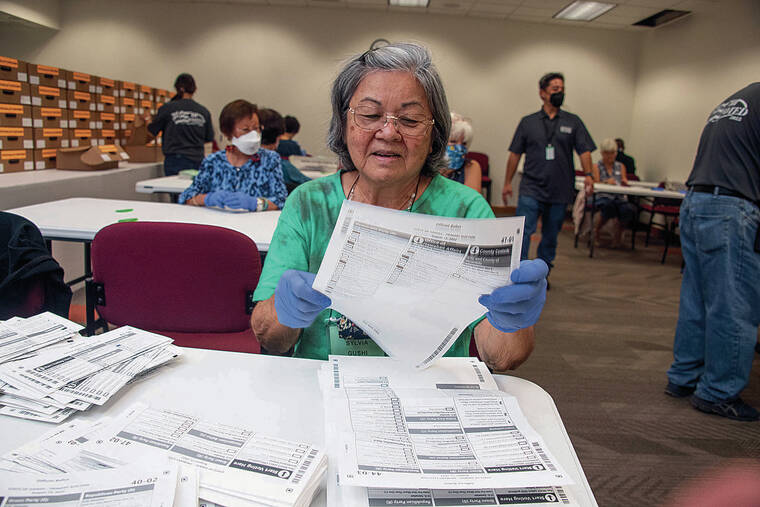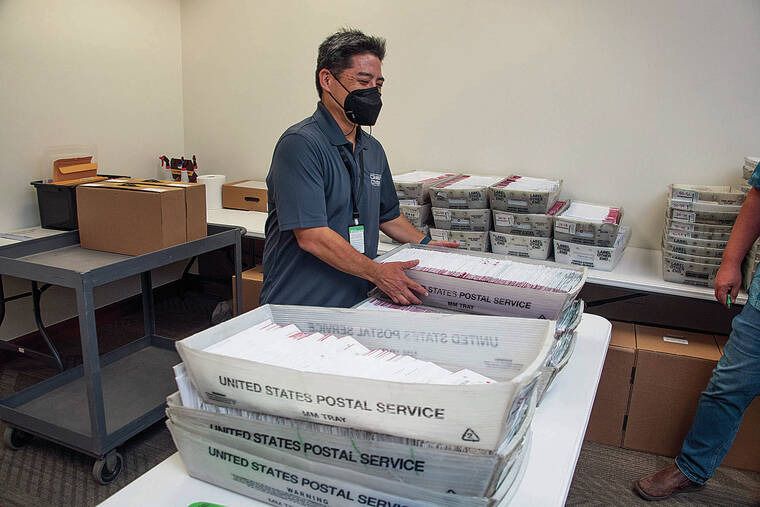The first full day of mail-in ballot processing began Wednesday at the state Capitol for the first 79,000 Oahu ballots mailed in amid heightened security and scrutiny.
The first shift of 30 or so election observers monitored every stage of the process, including verifying the transportation of sealed ballots from Honolulu “collection centers” — each signed by two observers who had to verify paperwork, including confirming each “seal number” on individual racks of ballots wrapped in cellophane.
Of the 730,000 mail-in ballots that were sent out across the islands last week, 107,000 were returned to collection centers in all counties as of Wednesday, said Scott Nago, chief elections officer for the state Office of Elections.
Each neighbor island collection center is doing its own processing of its county’s ballots under the watch of volunteer observers and will report their results to the Capitol on the day of the Aug. 13 party primary, followed by the Nov. 8 general election.
Ballot processing of Oahu ballots returned to the state Capitol this year after operations had to move to the Hawai‘i Convention Center during the 2020 elections due to COVID-19 and the subsequent shutdown of the Capitol.
While the Legislature is out of session and ballot processing begins, the Senate’s koa furniture, nameplates and stair rails have been covered in white cardboard, along with brown cardboard on the carpeting for protection.
As usual this year, elections officials have switched out the door locks to the Senate chamber, along with two upstairs Senate conference rooms for greater security.
As of Wednesday, 3,230 voters also had signed up for the new ballot tracking system that lets them get updates on where their ballots are in the process.
Upstairs at the state Capitol, volunteers opened the first sealed mail-in ballots and other groups pulled out the ballots and laid them out flat so they can be processed on the Senate floor — all while being watched by volunteer observers.
Veteran volunteer Sylvia Gushi, 74, of Salt Lake volunteered once again to unseal mail-in ballots to “do my community service,” she said.
Asked if she’s ever seen anything suspicious this year or in the past, Gushi said: “No fraud. Nope. No, no, no. In Hawaii, we’re pretty safe.”
Laura Nakasone, 74, of Wahiawa and Lorraine Fujiwara, 75, of Kalihi have volunteered for decades and on Wednesday were flattening ballots and putting them in stacks.
“They’ve improved the system,” Nakasone said. “There’s little chance of anything being inappropriate.”
Observers regularly rotate among the different stations, she said.
“They’re doing a lot to minimize questioning of the procedures,” Nakasone said. “The state is trying their very best.”
Kenyon Wong, 74, of Kaneohe has served as an elections observer since 2006 and has yet to see anything sketchy.
“Not in the state of Hawaii,” he said. “We know we have a good process here.”
On the Senate floor, Judith Wong, 72, of Kalani Iki volunteered to be an observer for the first time to see for herself how the system works.
“There’s been a lot of discussion in the news that the process is unsafe, not here, but nationally,” Wong said.
After her first day, Wong was prepared to tell her friends that the Hawaii election process is secure.
“It’s a very tight process,” she said. “There are checks at every single step. It’s very safe.”





 Stay updated on Hawaii and national elections coverage
Stay updated on Hawaii and national elections coverage